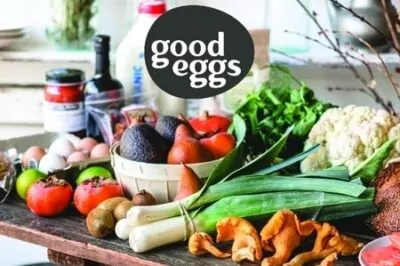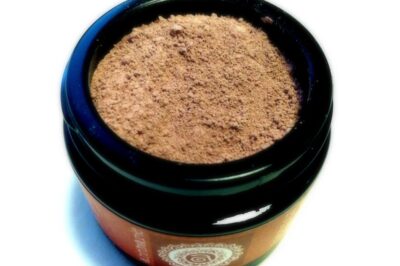Popular culture loves apples. It’s rumored that one a day will help one avoid visits to the doctor and that trees bearing these fruits have tempted garden dwellers to sin. This week, the good folks over at Good Eggs, a local food delivery service, are giving away a free bag of apples with every order (make sure you remember to add the item “free apples” to your order!). We decided to make Good Eggs our September We Heart feature. Read on to find out how Good Eggs is helping the local food movement, how you can score a free bag of apples from them (Sep. 8-13) and why apples are great for your skin!
(At the end of this article, also find out how to win a free product from us!)
The Good Eggs System Works Like This
First they vet a farm, ranch, or foodmaker according to their set of standards. Once approved, this company can sell their products on Good Eggs’ image-based and very eye-pleasing website. Once you place your order, the people making, growing, and raising your food tally up exactly how much to bring to the Good Eggs warehouse. The Good Eggs team then packs your order and delivers it to your house (even on weekends!). It’s as fresh as the food you buy at the farmers market, without having to look for parking.
How We Align
For Good Eggs, it’s not enough to simply brand themselves organic and call it a day. They outline specific guidelines that farmers, ranchers and producers must meet in order to sell through them. Food makers must pay their employees fair wages and treat them with respect. Ranchers must provide animals with ample access to the outdoors. Farmers must grow organically whenever possible. The full criteria is on their website.
If you know Annmarie Gianni Skin Care, you know that we’re not obsessed with labels. We like wild crafted herbs and plants grown without synthetic inputs, but a USDA organic label doesn’t necessarily woo us. We love that Good Eggs has specific requirements for the food it sells, taking into consideration human rights, sustainability, and taste!
Good Eggs is based in San Francisco, and has expanded to New Orleans, Los Angeles, and Brooklyn. If you happen to live in one of these locations now is the time to join the local food movement in what might be the most convenient way possible—with to-your-door service. For this week only, you can add a bag of free apples to your order!
Why Apples are Great for Your Skin
Apples don’t always get the credit they deserve as a healthy food, but we have a lot to say about them. For one, eating them promotes harmonious digestion, because they stimulate the production of saliva (yum), and contain pectin, a type of soluble fiber that helps lower your cholesterol and keep things moving.
Eating apples can improve your skin because they are rich in the following compounds:
- Boron
- Chromium
- Iron
- Copper
- Manganese
- Silica
Not Hungry?
You can enjoy the benefits of apples by putting them on your face, too!
Apples are great for those with sensitive or combination skin. As a mask, they are mildly exfoliating, and combat dryness as well as clogged pores. They have cleansing qualities while also softening the skin. This is perfect for anyone who has oily skin in some areas and dryness or signs of aging in others.
It’s easy to turn your apple into a facial mask: simply peel, core, and steam an apple, then mix it with a small amount of whole milk and honey (make sure you wait until the apple has cooled a bit before putting it on your face!). Leave it on for 15-20 minutes, or until it dries.
Why We Heart Local Food
It’s important to buy apples that have not been sprayed with pesticides so you can eat them skin and all. Contained in the skin are antioxidants quercetin, epicatechin (also found in green tea), and procyanidin.
Like all produce, apples that are grown for mass production are often bred to be large, to do well being transported long distances, and endure being kept on shelves. This practice sacrifices other characteristics, like flavor and nutritional content.
Additionally, small scale farming allows for more focus on soil quality, which suffers when farmers rely on chemical inputs to encourage plant growth. The nutritional content of a fruit or vegetable depends heavily on the quality of the soil it’s grown in. Once picked, nutritional content will start to decrease, so the less distance your food travels, the better.
Local Food from Good Eggs
Many of us have a romantic image of family farms that sustainably and lovingly tend to their land. We want to reduce health epidemics caused by poor diets, we want to reduce food miles when we shop, and we know that our food system must fundamentally change for these things to happen.
What some might not realize, however, is that we still have a long way to go before small scale farming becomes economically viable. The USDA estimates that in 2014, the median farming household income will be -$1,626, with these households instead relying on income from outside ventures to support themselves.
What Good Eggs is doing is helping to make small scale farming and local foodmaking more viable. You have farmers that are paying people to spend full days selling produce at farmers markets, or selling their produce to grocery stores and getting only a fraction of the profits. Similarly, you have people with talent for baking or making pasta sauce or arranging flowers, but they aren’t able to invest in a brick and mortar store. Delivering their products to dozens of individual stores and restaurants can be costly as well as time consuming.
Good Eggs makes it easier for these people to sell their products to people nearby, and easier for you to enjoy the fruits of their labor!
Love Local Food, but Don’t Live in Los Angeles, New Orleans, San Francisco, or Brooklyn?
Good Eggs aims to create a local food hub in every major city worldwide, but until then, we want to know what you’re doing to participate in the local food movement! Send us a photo of your visit to your local farmers market, your backyard vegetable garden, a community garden, or even your volunteer efforts with a local food organization.
Everyone who submits a photo will receive a coupon for 20% off one Annmarie Gianni Skin Care product. Three randomly selected entries will win a free product of their choice!
Send photos to [email protected] to participate. Contest ends and winners will be announced next Tuesday, September 15th.
We Heart is a monthly column, subscribe to keep up with the products and companies we love!
by Hope Freije
Sources:
http://www.takepart.com/article/2013/05/29/good-eggs-tech-food-labor
http://www.grubstreet.com/2013/03/local-food-movement-farmers.html
http://www.nytimes.com/2014/08/10/opinion/sunday/dont-let-your-children-grow-up-to-be-farmers.html?_r=3
http://www.takepart.com/article/2014/08/28/food-waste-consumed-and-lost?cmpid=tp-twtr
http://www.ers.usda.gov/topics/farm-economy/farm-household-well-being/2014-farm-household-income-forecast.aspx#.VAdlO_ldWMM





For those of us in Western Canada, we can order sustainable, local and organic foods through http://www.spud.ca to be delivered to our door on a weekly or bi-weekly basis.
I’m confused about the comment about coffee making your skin oily under the chromium section.
•Chromium: Reduces sugar cravings. Sugar is a stimulant, which means it stimulates the body’s systems, including oil production. Ever noticed how your skin can look oily after you drink a lot of coffee?
You are talking about sugar and then switch to coffee. What does coffee have to do with chromium and sugar? When I drink coffee, I don’t add sugar to it. Or are you referring to the fact that coffee is a stimulant? Thanks.
Hi Amanda, I was referring to coffee being a stimulant, like sugar is.